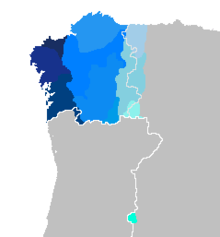Galician language
| Galician | |
|---|---|
| galego | |
| Pronunciation | [ɡaˈleɣo̝] |
| Region | Galicia and adjacent areas in Asturias and Castile and León |
|
Native speakers
|
2.4 million (2012) 58% of the population of Galicia are L1 speakers (2007) |
|
Early forms
|
Galician-Portuguese
|
|
Galician alphabet (Latin script) Galician Braille |
|
| Official status | |
|
Official language in
|
Galicia (Spain) Official regional language. Decades of development as language of literature, including poetry and essays for all levels of education. Growing sense of ethnic identity. |
| Regulated by | Royal Galician Academy |
| Language codes | |
| ISO 639-1 | gl |
| ISO 639-2 | |
| ISO 639-3 | |
| Glottolog | gali1258 |
| Linguasphere | 51-AAA-ab |

Distribution of the various dialects of Galician in Spain and the extreme north of Portugal.
|
|
Galicia (Spain)
Galician (/ɡəˈlɪʃən/ or /ɡəˈlɪsi.ən/; galego [ɡaˈleɣʊ]) is an Indo-European language of the Western Ibero-Romance branch. It is spoken by some 2.4 million people, mainly in Galicia, an autonomous community located in northwestern Spain, where it is official along with Spanish. The language is also spoken in some border zones of the neighbouring Spanish regions of Asturias and Castile and León, as well as by Galician migrant communities in the rest of Spain, in Latin America, the United States, Switzerland and elsewhere in Europe.
Modern Galician is part of the West Iberian languages group, a family of Romance languages that includes the Portuguese language, which developed locally from Vulgar Latin and evolved into what modern scholars have called Galician-Portuguese. Dialectal divergences are observable between the northern and southern forms of Galician-Portuguese in 13th-century texts but the two dialects were similar enough to maintain a high level of cultural unity until the middle of the 14th century, producing the medieval Galician-Portuguese lyric. The divergence has continued to this day, producing the modern languages of Galician and Portuguese.
...
Wikipedia
